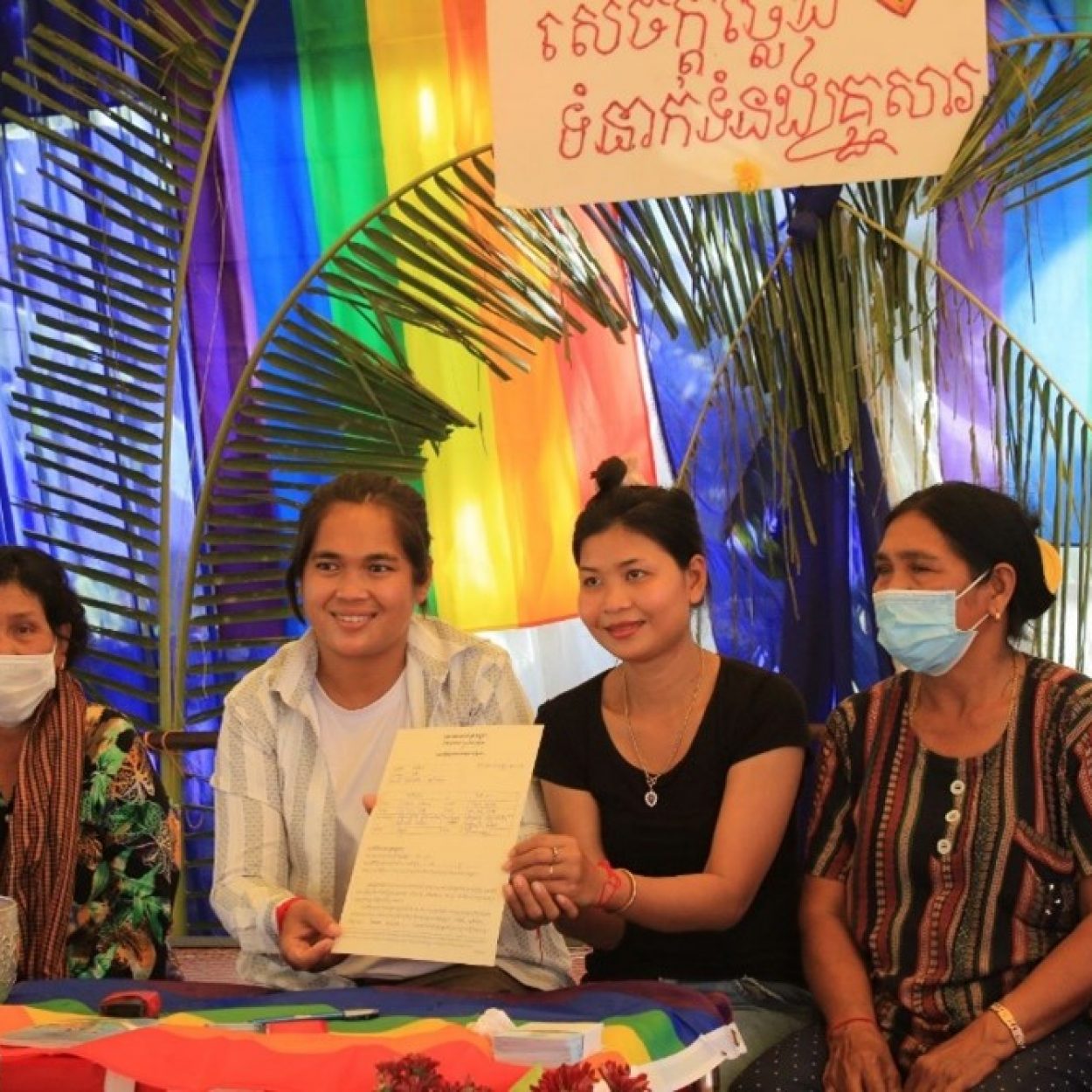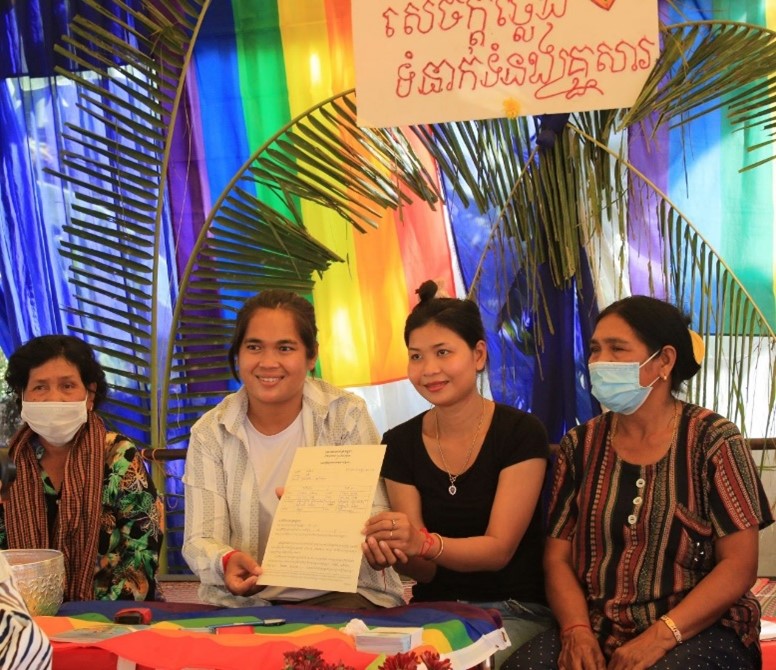
Cambodia continues the journey towards legal marriage equality
In June, Thailand became the first country in Southeast Asia to legalise same-sex marriage. It is a huge victory for Thai LGBTQ+ activists and one that many are hoping will have positive ripple effects in the region. Meanwhile for countries that haven’t yet reached this milestone, local LGBTQ+ communities, advocates, and civil society organisations are still finding ways to secure equal rights for LGBTQ+ persons and same-sex couples. IWDA partner Rainbow Community Kampuchea is one of those organisations.
While Cambodia does not criminalise diverse sexual orientations or gender identities, LGBTQ+ people nonetheless do not benefit from explicit legal protections under the current legal system. Cambodian state law, for example, does not explicitly ban same-sex relationships, yet under the current law same-sex couples are not yet able to legally marry – thereby denying Cambodian LGBTQ+ couples essential legal protections and formal recognition of their relationships and families, including preventing them from accessing full adoption rights of their children.
For couples like Channa and Sopheap, this leaves them with little legal protection when it comes to building a life together – and worsens the social discrimination they face.
Channa and Sopheap had been together five years when they first went to Rainbow Community Kampuchea (RoCK), the Cambodian LGBTQ+ led organisation, for support.
Like many LGBTQ+ couples, Channa, a transgender man, and Sopheap have faced multiple forms of discrimination, rejection and hardship simply for living their life authentically.
“When I cut my hair [shorter] like a man, my parents didn’t like it so they stopped allowing me to stay home, and I didn’t go home for almost 5 years,” Channa explained.
For those five years, Channa lived apart from his family and was ostracised by his community as he strived to prove his worth in a society that continuously denied his identity – including his partner’s own family.
“My mother said that if I love [Channa] I will not have a future. She was so angry and asked me to move out of her house because she will not accept me as her daughter anymore,” Sopheap shared.
Both Channa and Sopheap have experienced negative mental health impacts as a result of their families’ initial refusal to accept their love, with Channa having considered suicide on multiple occasions because of their rejection.
This kind of discrimination is sadly common for many LGBTQ+ people in Cambodia, affecting how LGBTQ+ people navigate every aspect of life – in their families, workplaces, schools, public spaces or when trying to access public and administrative services.
Advocating for Cambodia’s Rainbow Families
Since 2009, IWDA partner RoCK has been working to break down these barriers to create a Cambodian society where LGBTQ+ people can enjoy full inclusion and equal rights in all aspects of their lives. The focus of this work has been on chipping away at discriminatory attitudes and practices within the three institutions at the core of Cambodian society: the family, community and the state.
Through community organising and advocacy, RoCK is campaigning to increase the acceptance of LGBTQ+ persons and ‘rainbow families’ in Cambodia, referring to families where one or more members’ gender identity or sexual orientation challenges heteronormativity.
Channa and Sopheap are one of these families who were able to step by step gain more recognition and acceptance from their families and communities, and, thanks to RoCK’s work, were able to sign a Declaration of Family Relationship as interim evidence of their relationship while they are not yet able to legally marry and enjoy all protections as legally married opposite sex couples.
Colloquially known as a ‘private love contract form’, RoCK worked in collaboration with experienced lawyers and supportive local government officials in Commune Councils to develop a Declaration of Family Relationship (DoFR). Written in accordance with key elements of Cambodian civil law, the DoFR is legally non-binding but nonetheless creates an immediate and interim protective tool that same-sex couples can access despite not yet being able to legally marry under Cambodian law.
Channa and Sopheap are one of 32 couples to have registered under the Declaration of Family Relationship as of 2024. They have since been living together for over eight years with their son. As well as publicly recognising their relationship and commitment to each other, the DoFR sets out Channa and Sopheap’s commitments to taking care of their child and shared property – affording them some interim protections as a couple and family.
Since then, Channa and Sopheap have been sharing their story with the public through the media, RoCK’s community initiatives and their own social media channels, becoming powerful advocates that are changing community attitudes and perception about LGBTQ+ relationships. Their continued commitment to each other despite the hardships has also led to a positive change of attitude and mindset from their own families, with their parents, siblings and extended family now being supportive of their love.
Channa and Sopheap’s courage in sharing their story in this way has become more common in Cambodian society, with other LGBTQ+ people in recent years having the courage to come out and be more visible in the media and online spaces. This increase in visibility of LGBTQ+ people – combined with the education and awareness raising work carried out by LGBTQ+ community members and civil society, supportive public statements by local authorities and national government representatives encouraging non-discrimination – is changing broader attitudes in Cambodian society and improving public awareness and acceptance of LGBTQ+ communities.
As LGBTQ+ communities and advocates continue to work towards achieving legal marriage equality, including by sharing inspiring stories on social media and media for continuing to grow public acceptance and support for marriage equality, initiatives like RoCK’s private love contract form provides an immediate and temporary pathway for same-sex couples to be viewed more equally in Cambodian society – all while normalising and destigmatising same-sex relationships to the community.
For couples like Channa and Sopheap, the DoFR is a powerful, validating process that offers their love some of the recognition it deserves as they continue to strive for true and full equality.
